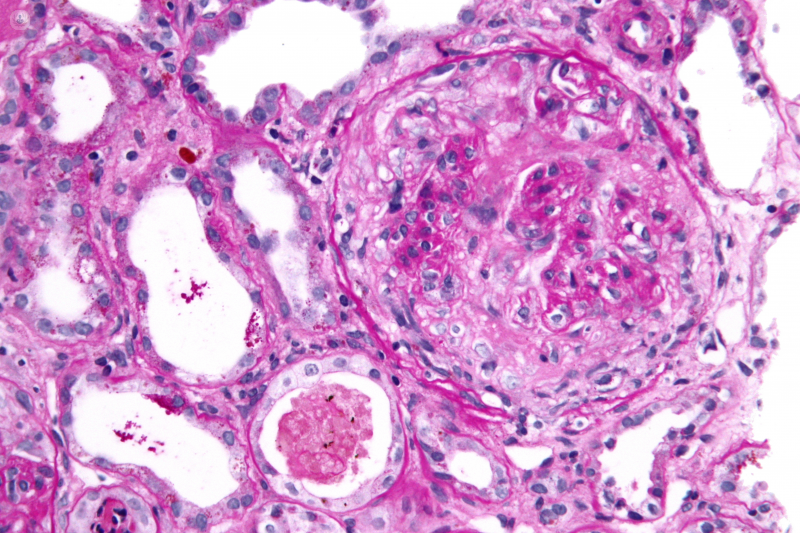Glomerulonephritis – A quick guide
Written by:There are a wide variety of diseases which can cause damage in the kidney, often by causing inflammation, and which may be limited just to the kidneys or involve the whole body. These are called glomerulonephritis, and there are many types.
Renowned consultant nephrologist, Professor Jeremy Levy, is here to give us the facts.

Symptoms of glomerulonephritis
The different varieties of glomerulonephritis almost always cause the kidneys to leak blood or protein into the urine, which is detected by a urine test. This is often the first or only sign, and is not usually visible. Many patients have no symptoms at all initially.
When symptoms do occur, they can include classic symptoms of nephropathy:
- swelling of the legs (oedema)
- sometimes, shortness of breath
- abdominal pain
If affecting more than the kidneys, the following symptoms can also manifest:
- joint pains
- rashes
- red eyes
- facial pain or sinus disease
- rarely, coughing blood
Nephrotic syndrome
In severe cases of glomerulonephritis, large amounts of protein can leak from the kidneys into the urine. This can cause oedema (swelling) in the legs and in other parts of the body, also known as nephrotic syndrome.

Diagnosing glomerulonephritis
A diagnosis requires blood and urine tests, an ultrasound scan, and sometimes a kidney biopsy (a small sample is taken out from one kidney through a needle under local anaesthetic).
Treating the problem
Depending on the type of glomerulonephritis, treatment is almost always needed in the form of medications, ranging from simple blood pressure treatments (as with several kidney disease treatments, such as for polycystic kidney disease) to stronger drugs which suppress the body's immune system.
Treatment might be needed for many months or years, or even lifelong, depending on the precise disease. These treatments require close monitoring.
A healthy diet is important, as is exercise. Most of these diseases can be very effectively treated if caught early and the right treatment is chosen. Without treatment, patients can end up with kidney failure and need dialysis or a kidney transplant.
Professor Jeremy Levy is a highly regarded consultant nephrologist with over 30 years' experience.
If you are experiencing symptoms of glomerulonephritis, don't hesitate to book an appointment with Professor Levy via his Top Doctors profile today.


